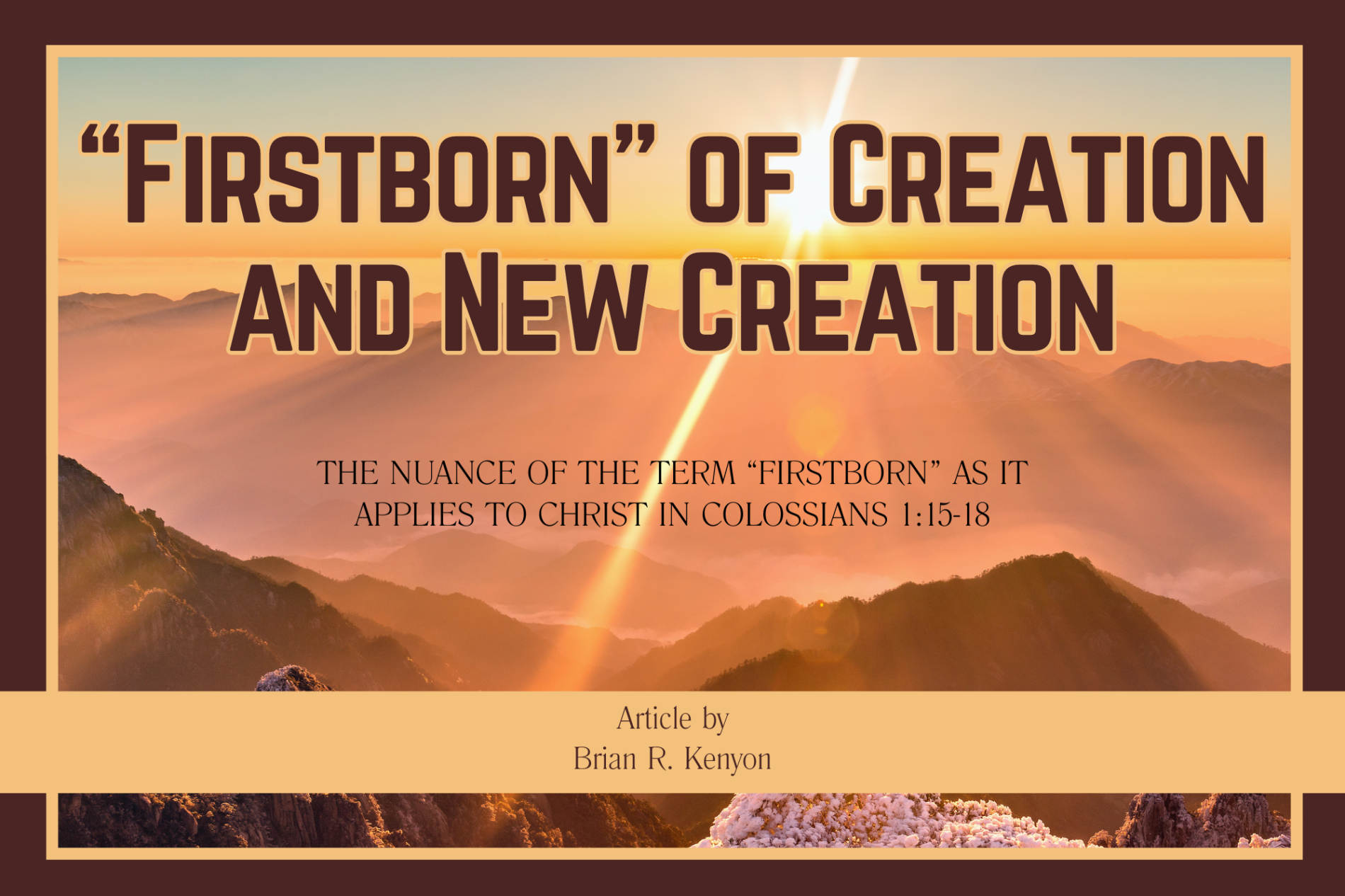By Brian R. Kenyon
The term “firstborn” in Colossians 1:15, 18 has caused some misunderstanding and has given rise for “untaught and unstable people” to “twist … the Scriptures” (2 Pet. 3:16 cf. Gal. 1:6-9). Before we examining the term “firstborn,” let us see the term in its immediate context. Paul wrote:
He [Christ] is the image of the invisible God, the firstborn over all creation. 16 For by Him all things were created that are in heaven and that are on earth, visible and invisible, whether thrones or dominions or principalities or powers. All things were created through Him and for Him. 17 And He is before all things, and in Him all things consist. 18 And He is the head of the body, the church, who is the beginning, the firstborn from the dead, that in all things He may have the preeminence. (Col. 1:15-18)
Preeminent Over Creation
Some take the “firstborn over all creation” to mean that Jesus was created (.e., “born”) and then created everything else. In fact, the New World Translation (of the Jehovah’s Witnesses) have actually inserted the word “other” so that it reads, “… by him all other things were created …” (Col. 1:16). Why would they change the Bible to read that way? Because they falsely teach that Jesus was a created being, they change the wording of the Bible to fit their doctrine (cf. Jn. 1:1-3, 14). However, if people are allowed to add or take away words from the Bible, they can make it teach anything they want!
Although “firstborn” (from prototokos, πρωτό-τοκος) can sometimes refer to chronology (Gen. 19:31-37; Heb. 11:28), it can also, as here, refer to something preeminent. The word “all” in context refutes the teaching that Christ was first created because He would had to have created Himself. “Firstborn” can be defined as existing before all creation or superior to all creation (Rev. 1:5). Jesus was “begotten of the Father” (Jn. 1:18, 18; Heb. 1:5), not created. The word “firstborn” here describes the Son in His eternal being, not the Son incarnate.
Consider these other uses of “firstborn,” showing the term cannot refer to chronological order. When the time would come, God told Moses to tell Pharaoh, “Israel is My son, My firstborn” (Ex. 4:22). Israel, who was formerly known as Jacob (cf. Gen. 32:28), was not the first born in a chronological way. Esau preceded him in birth (Gen. 25:24-26). However, Israel was certainly the preeminent son in that he was a descendant of the promised Messianic line (cf. Gal. 3:16). Furthermore, the psalmist wrote of the coming Messiah, “I will make him My firstborn, The highest of the kings of the earth” (Ps. 89:27). The idea of preeminence is highlighted with “firstborn” and “highest” complimenting one another. The Hebrews writer acknowledged, “But when He again brings the firstborn into the world, He says: ‘Let all the angels of God worship Him’” (Heb. 1:6).
Clearly, “firstborn” does not mean Jesus was first created so He could create everything else. To the contrary, He was not only the agent of creation (Jn. 1:3; Heb. 11:3), but His gospel is the main reason why this universe was created “through Him and for Him” (Col. 1:16 cf. Acts 17:26-27; Rom. 1:20).
Preeminent Over New Creation
Not only is Jesus preeminent over creation, but He is also the preeminent “head” over His “body, the church” (Col. 1:18), His spiritual recreation (cf. 2 Cor. 5:17; Gal. 6:15). In this context, Jesus is called “the firstborn from the dead.” This, of course, does not mean that Jesus was the first person to be risen from the dead. For there were others, in both Old and New Testaments, who were raised from the dead; namely, the widow of Zarephath’s son (1 Kgs. 17:17-22), the Shunammite widow’s son (2 Kgs. 4:32-35), the man thrown into Elisha’s tomb (2 Kgs. 13:20-21), Jairus’ daughter (Mt. 9:18-26), the widow’s son at Nain (Lk. 17:11-17), Lazarus (Jn. 11:1-44), Tabitha, or Dorcus (Acts 9:36-42), Euthychus (Acts 20:7-12), and many saints after Jesus’ resurrection (Mt. 27:50-53). Jesus, however, was the preeminent one to rise from the dead because He is the only one to have resurrected never to die again. Jesus’ resurrection is the unique event that made possible the church and which gives it hope (cf. Rom. 1:4; 1 Pet. 1:3).
The preeminence of Jesus’ “firstborn from the dead” status was predicted long before He “became flesh and dwelt among us” (Jn. 1:14). David wrote:
I have set the Lord always before me; Because He is at my right hand I shall not be moved. 9Therefore my heart is glad, and my glory rejoices; My flesh also will rest in hope. 10For You will not leave my soul in Sheol, Nor will You allow Your Holy One to see corruption. (Ps. 16:8-10)
This was the passage from David used by Peter in the inauguration of the church, the Messianic kingdom:
For David says concerning Him: “I foresaw the Lord always before my face, For He is at my right hand, that I may not be shaken. 26Therefore my heart rejoiced, and my tongue was glad; Moreover my flesh also will rest in hope. 27For You will not leave my soul in Hades, Nor will You allow Your Holy One to see corruption.” … 31he [David], foreseeing this, spoke concerning the resurrection of the Christ, that His soul was not left in Hades, nor did His flesh see corruption. (Acts 2:25-31)
Later, Paul would also refer to Psalm 16:8-10, along with two other Old Testament prophecies fulfilled by Jesus’ resurrection. When He was asked by the “rulers of the synagogue” in Antioch of Pisidia whether he wanted to give a “word of exhortation” (Acts 13:14-15), Paul stood up and gave a brief history of God’s people (Acts 13:16-41). As Paul was concluding, he declared:
God has fulfilled this [the promised gospel, Acts 13:32] for us their children, in that He has raised up Jesus. As it is also written in the second Psalm: “You are My Son, Today I have begotten You [Ps. 2:7].” 34And that He raised Him from the dead, no more to return to corruption, He has spoken thus: “I will give you the sure mercies of David [Isa. 55:3].” 35Therefore He also says in another Psalm: “You will not allow Your Holy One to see corruption [Ps. 16:10].” 36For David, after he had served his own generation by the will of God, fell asleep, was buried with his fathers, and saw corruption; 37but He whom God raised up saw no corruption. (Acts 13:33-37)
As Paul stood before King Agrippa, among the truths he stated was “that the Christ would suffer, that He would be the first to rise from the dead, and would proclaim light to the Jewish people and to the Gentiles” (Acts 26:23).
Although some translations connect “first” with proclaiming the good news, in the New King James Version, the word “first,” in “the first to rise from the dead,” is from protos (πρωτος), which can refer to chronological order (Acts 7:12; 12:10), but in this context, it carries the same meaning as “firstborn,” which is the idea of being foremost, prominent, most important (Acts 13:50, “chief men”). Again, Jesus was not the first chronologically to rise from the dead, but He was (and is) the preeminent One to do so (cf. Rom. 1:4)!
Other terms in the Colossians 1:18 context also bear this out. Jesus was said to be “in the beginning,” which means that as Christ was the beginning agent in creation, He was also the beginning agent of the new creation, His church, in that He was raised from the dead to never die again (cf. Acts 1:9-11). “Preeminence [first place in everything, NAS]” is from a word (proteuo, πρωτεύω) that means to have first place, be above all else. This word only occurs here in the New Testament, although a compound of the word is found in Third John 9 where it is translated “loves to have the preeminence” (from philoprotueo, φιλοπρωτεύω). Clearly, Jesus is the premier, one of a kind being sent and willingly came from heaven (Jn. 3:16; 8:42; Phil. 2:6-11)!
Conclusion
There has never been, nor will there ever be, another person like Jesus! He is God (Jn. 1:1, 14), and He is man (1 Tim. 2:5). God’s tremendous love, unfathomable to the human mind (cf. 2 Cor. 9:15), sent Him to this earth to be our sacrifice (Jn. 3:16; Phil. 2:6-8). Jesus will forever be identified with humanity (cf. 1 Cor. 15:27-28). Jesus is indeed preeminent over creation and new creation (Col. 1:16-18)! It is no wonder then, that “there is no other name under heaven given among men by which we must be saved” (Acts 4:12), and that name is Jesus (Mt. 1:21). Let us love Him, honor Him, and give ours lives to His cause!

 Alumni
Alumni Lectureship Audio
Lectureship Audio Lectureship Video
Lectureship Video
